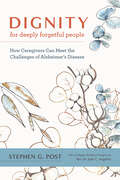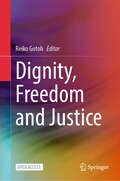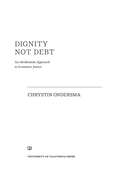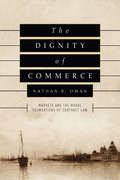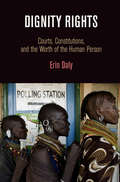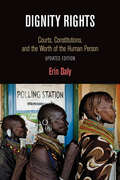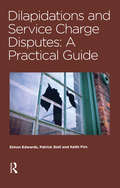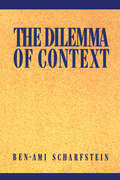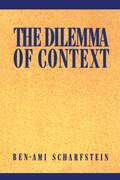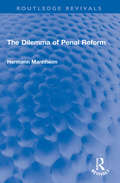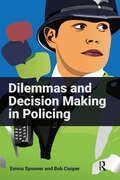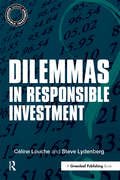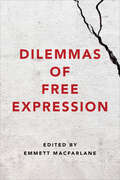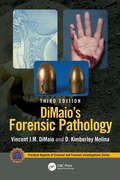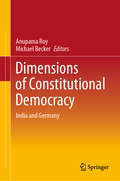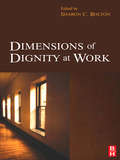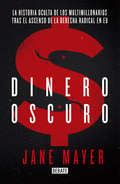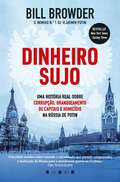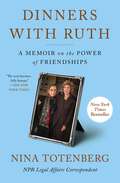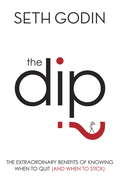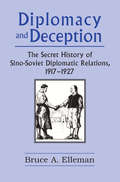- Table View
- List View
Dignity for Deeply Forgetful People: How Caregivers Can Meet the Challenges of Alzheimer's Disease
by Stephen G. PostFor caregivers of deeply forgetful people: a book that combines new ethics guidelines with an innovative program on how to communicate and connect with people with Alzheimer's.How do we approach a "deeply forgetful" loved one so as to notice and affirm their continuing self-identity? For three decades, Stephen G. Post has worked around the world encouraging caregivers to become more aware of—and find renewed hope in—surprising expressions of selfhood despite the challenges of cognitive decline. In this book, Post offers new perspectives on the worth and dignity of people with Alzheimer's and related disorders despite the negative influence of "hypercognitive" values that place an ethically unacceptable emphasis on human dignity as based on linear rationality and strength of memory. This bias, Post argues, is responsible for the abusive exclusion of this population from our shared humanity. With vignettes and narratives, he argues for a deeper dignity grounded in consciousness, emotional presence, creativity, interdependence, music, and a self that is not "gone" but "differently abled." Post covers key practical topics such as: • understanding the experience of dementia• noticing subtle expressions of continuing selfhood, including "paradoxical lucidity" • perspectives on ethical quandaries from diagnosis to terminal care and everything in between, as gleaned from the voices of caregivers• how to communicate optimally and use language effectively • the value of art, poetry, symbols, personalized music, and nature in revealing self-identity• the value of trained "dementia companion" dogsAt a time when medical advances to cure these conditions are still out of reach and the most recent drugs have shown limited effectiveness, Post argues that focusing discussion and resources on the relational dignity of these individuals and the respite needs of their caregivers is vital. Grounding ethics on the equal worth of all conscious human beings, he provides a cautionary perspective on preemptive assisted suicide based on cases that he has witnessed. He affirms vulnerability and interdependence as the core of the human condition and celebrates caregivers as advocates seeking social and economic justice in an American system where they and their loved ones receive only leftover scraps. Racially inclusive and grounded in diversity, Dignity for Deeply Forgetful People also includes a workshop appendix focused on communication and connection, "A Caregiver Resilience Program," by Rev. Dr. Jade C. Angelica.
Dignity, Freedom and Justice
by Reiko GotohThis is an open access book.Modern society is characterized by the fact of contingency, uncertainty, and ambiguity. The purpose of this book is to transform this phenomenal fact into a hopeful norm. As a clue, the book examines the concept of dignity and looks forward to a new definition. So far, the concept of dignity has been peripheral to the concerns of liberal social sciences. This book uses the concept of dignity as a source of light to illuminate the fundamental critique of liberal social sciences and philosophy. Can the theory of justice or discourse ethics truly realize the well-defined society it envisions in a fundamentally contingent, uncertain, and ambiguous situation? Can societies be inclusive of minorities relegated to the periphery with their dignity undermined? Can we resist the temptation to construct huge hierarchical stairs, forcing individuals to place themselves on one of its steps, and thus lining up different and diverse entities in along sequence, and eventually bringing about totalitarianism? This book has a three-level telescopic structure. At the very front, there is a scope of reexaming the political liberalism in the light of dignity. Behind it is a scope of reconstructing a theory of justice in modern society. Further behind it, there is a scope encompassing reflection on the methodology of liberal social sciences and philosophy. We leave it to the reader's imagination as to which scope to read this book through, and what image will emerge from the three scopes taken together. It is our hope that this book helps readers envision as a "realistic utopia" a society in which "no one is left behind," including wounded little birds.
Dignity Not Debt: An Abolitionist Approach to Economic Justice
by Chrystin OndersmaAn earth-shaking reimagining of household debt that opens up a new path to financial security for all Americans. American households have a debt problem. The problem is not, as often claimed, that Americans recklessly take on too much debt. The problem is that US debt policies have no basis in reality. Weaving together the histories and trends of US debt policy with her own family story, Chrystin Ondersma debunks the myths that have long governed debt policy, like the belief that debt leads to prosperity or the claim that bad debt is the result of bad choices, both of which nest in the overarching myth of a free market unhindered by government interference and accessible to all. In place of these stale narratives, Ondersma offers a compelling, flexible, and reality-based taxonomy rooted in the internationally recognized principle of human dignity. Ondersma’s new categories of debt—grounded in abolitionist principles—revolutionize how policymakers are able to think about debt, which will in turn revolutionize the American debt landscape itself.
The Dignity of Commerce: Markets and the Moral Foundations of Contract Law
by Nathan B. OmanWhy should the law care about enforcing contracts? We tend to think of a contract as the legal embodiment of a moral obligation to keep a promise. When two parties enter into a transaction, they are obligated as moral beings to play out the transaction in the way that both parties expect. But this overlooks a broader understanding of the moral possibilities of the market. Just as Shakespeare’s Shylock can stand on his contract with Antonio not because Antonio is bound by honor but because the enforcement of contracts is seen as important to maintaining a kind of social arrangement, today’s contracts serve a fundamental role in the functioning of society. With The Dignity of Commerce, Nathan B. Oman argues persuasively that well-functioning markets are morally desirable in and of themselves and thus a fit object of protection through contract law. Markets, Oman shows, are about more than simple economic efficiency. To do business with others, we must demonstrate understanding of and satisfy their needs. This ability to see the world from another’s point of view inculcates key virtues that support a liberal society. Markets also provide a context in which people can peacefully cooperate in the absence of political, religious, or ideological agreement. Finally, the material prosperity generated by commerce has an ameliorative effect on a host of social ills, from racial discrimination to environmental destruction. The first book to place the moral status of the market at the center of the justification for contract law, The Dignity of Commerce is sure to elicit serious discussion about this central area of legal studies.
Dignity Rights
by Aharon Barak Erin DalyThe right to dignity is now recognized in most of the world's constitutions, and hardly a new constitution is adopted without it. Over the last sixty years, courts in Latin America, Europe, Asia, Africa, the Middle East, and North America have developed a robust jurisprudence of dignity on subjects as diverse as health care, imprisonment, privacy, education, culture, the environment, sexuality, and death. As the range and growing number of cases about dignity attest, it is invoked and recognized by courts far more frequently than other constitutional guarantees.Dignity Rights is the first book to explore the constitutional law of dignity around the world. Erin Daly shows how dignity has come not only to define specific interests like the right to humane treatment or to earn a living wage, but also to protect the basic rights of a person to control his or her own life and to live in society with others. Daly argues that, through the right to dignity, courts are redefining what it means to be human in the modern world. As described by the courts, the scope of dignity rights marks the outer boundaries of state power, limiting state authority to meet the demands of human dignity. As a result, these cases force us to reexamine the relationship between the individual and the state and, in turn, contribute to a new and richer understanding of the role of the citizen in modern democracies.
Dignity Rights: Courts, Constitutions, and the Worth of the Human Person (Democracy, Citizenship, and Constitutionalism)
by Erin DalyOriginally published in 2012, Dignity Rights is the first book to explore the constitutional law of dignity around the world. In it, Erin Daly shows how dignity has come not only to define specific interests like the right to humane treatment or to earn a living wage, but also to protect the basic rights of a person to control his or her own life and to live in society with others. Daly argues that, through the right to dignity, courts are redefining what it means to be human in the modern world. As described by the courts, the scope of dignity rights marks the outer boundaries of state power, limiting state authority to meet the demands of human dignity. As a result, these cases force us to reexamine the relationship between the individual and the state and, in turn, contribute to a new and richer understanding of the role of the citizen in modern democracies.This updated edition features a new preface by the author, in which she articulates how, over the past decade, dignity rights cases have evolved to incorporate the convergence of human rights and environmental rights that we have seen at the international level and in domestic constitutions.
Dilapidations and Service Charge Disputes: A Practical Guide
by Simon Edwards Patrick Stell Keith FirnWritten by three surveyors, each with extensive experience in the sector, Dilapidations and Service Charge Disputes will guide practitioners through the common and new practices involved in dealing with disputes on dilapidations and service charge matters. The book offers practical guidance on the related topics of dilapidations and service charge disputes, bridging the gap between heavy-weight legally focussed case law publications and the lighter weight guidance notes. It offers practical and theoretical advice that will be invaluable to any surveyor or solicitor dealing with: condition reports prior to a lease agreement litigation avoidance advice dilapidations law and precedent. Beneficial to surveyors and solicitors acting on behalf of tenants or landlords, this book provides the information and practical advice that can help you improve in your role.
The Dilemma of Context
by Ben-Ami ScharfsteinIn The Dilemma of Context, Scharfstein contends that the problems encountered with context are insoluble. He explains why this problem lays an intellectual burden on us that, while remaining inescapable,can become so heavy it destroys the understandingit was created to further.
The Dilemma of Context
by Ben-Ami ScharfsteinIn The Dilemma of Context, Scharfstein contends that the problems encountered with context are insoluble. He explains why this problem lays an intellectual burden on us that, while remaining inescapable,can become so heavy it destroys the understandingit was created to further.
The Dilemma of Penal Reform (Routledge Revivals)
by Hermann MannheimFirst Published in 1939, The Dilemma of Penal Reform presents Hermann Mannheim’s discussion on the impact of economic, social, and legal factors on methods of punishment. Set against the background of author’s wide knowledge in German, French, American and Soviet penal methods, the volume brings comparative analysis to address the question, whether it is possible to combine the old practice of making life inside prison less attractive than outside with the outlook aiming at the regeneration of prisoners, and to reconcile the stigma connected with a fair chance of rehabilitation. It also examines the conflict between the requirement of modern penology and some traditional principles of criminal procedure specially for the juvenile courts. One of the pioneering works in the history of Penal Reform, this book will be of interest to scholars and researchers of legal history, law, sociology, and social work.
Dilemmas and Decision Making in Policing
by Emma Spooner Bob CooperExplores how policing students and police officers might apply theory to tackle dilemmas demonstrated through true to life scenarios.Relevant for those undertaking the Professional Policing degree, Apprenticeships or the Degree Holder Entry Programme, as well as their academic and work-based educators, it examines the complexities faced on a daily basis by frontline officers. A range of fictional realistic case studies are presented in order to highlight contemporary challenges in the modern policing landscape. These are unpicked through discussion and reflective questions, exploring how decisions are made based on theoretical understanding and practical considerations in context. Key themes within these scenarios include procedural justice, legitimacy, organisational culture, prioritisation of workload, objectivity and neutrality, human rights and values. The book provides students and their educators with the opportunities to discuss policing dilemmas and decision-making in a safe space.
Dilemmas in Responsible Investment (The Responsible Investment Series)
by Céline Louche Steve LydenbergImagine that you are a responsible investment money manager. One of your clients is asking you to sell her holdings in a company because it has been accused in the press of contracting with suppliers that have abusive labour conditions. You have to evaluate and benchmark the CSR performance of a number of companies from the same industry but among them there are companies, primarily the smallest, that provide little or no CSR information. One of your major clients is asking you to exclude companies involved in nanotechnology What would you do? Responsible investment (RI) – the integration of environmental, societal and governance (ESG) issues into investment decision-making – can be difficult and complex. Including or excluding companies, engaging with companies, partnering with stakeholders, evaluating environmental and societal controversies, defining criteria and, all the while, producing a competitive return for investors can raise multiple questions that cannot be dealt with simply. The practice of RI faces many such dilemmas as it seeks to balance the competing goals of business, society, and finance and to judge how best to reconcile what are often conflicting concerns. Dilemmas in Responsible Investment examines the problems responsible investment practitioners face daily. It emphasises the importance of asking the right questions as well as getting the right answers; and the importance of process as well as product. The authors pay attention to the diversity of opinion and variety of approaches available. They also raise fundamental questions about the very purpose of investment and the responsibilities of investors, both economic and societal. Although dilemmas in RI are not always easily resolved, Louche and Lydenberg believe that they are also a source of valuable and necessary debate about the appropriate role of corporations in society and the ability of the financial markets to appropriately serve the societies in which they operate. Such dilemmas provide a valuable framework for public debate and can encourage the emergence of innovative answers and approaches. Responsible investors join in these debates when they examine the societal and environmental implications of business activities, actions and behaviour Facilitate dialogue between corporations and their stakeholders Encourage corporate transparency on societal and environmental issues Reward companies that are making genuine efforts towards sustainability Integrate societal and environmental data into financial analysis. The book first of all provides a state-of-the-art overview of responsible investment, its history and development, explanations of key terms and a guide to the different actors involved in the field. Second, it presents 12 diverse hypothetical case studies that examine a wide spectrum of the challenges facing RI professionals, raising questions about the relationship between business and society, about the purpose of investment, and about the responsibilities of investors to various segments of society and the environment. The (often interconnected) cases present a dilemma, possible approaches available, variable factors, a variety of quotations and suggested responses from 35 leading professionals in the responsible investment community, real-world examples and comparisons and recommendations. Accessible, vivid and illuminating, Dilemmas in Responsible Investment is the first book specifically written for teaching and professional training in responsible investment. It will be required reading for students, academics and practitioners in the areas of finance, ethics and CSR.
Dilemmas of Free Expression
by Emmett MacfarlaneFree expression is under threat. Social media and "fake news," misinformation, and disinformation have prompted governments to propose new forms of regulation that are deeply challenging to free expression. Hate speech, far-right populism, campus speech debates, and censorship consistently make headlines in Canada and abroad. Dilemmas of Free Expression offers forward-looking appraisals of ways to confront challenging moral issues, policy problems, and controversies that pay heed to the fundamental right to free expression. The essays in this volume offer timely analyses of the law, policy, and philosophical challenges, and social repercussions to our understanding of expressive freedom in relation to government obligations and public discourse. Free expression and its limits are multifaceted, deeply complex, inherently values-based, and central to the ability of a society to function. Dilemmas of Free Expression addresses the challenges of limiting free expression across a host of issues through an analyses by leading and emerging voices in a number of disciplines, including political science, law, philosophy, and Indigenous studies.
Dilemmas of Intellectual Property Discourse in Sri Lanka
by Asanka PereraThis book examines global and national lawmaking in Sri Lanka through three case studies: patent examination, plant variety laws, and technology innovation. It evaluates how various lawmakers influence intellectual property law to support innovation and development in Sri Lanka. The book explores Sri Lanka’s intellectual property laws and the mismatch between its international obligations, such as Trade Related Aspects of Intellectual Property Agreement (TRIPS), and the Patent Cooperation Treaty (PCT), and their implementation. It examines the repercussions of this mismatch and provides insights for the future of Sri Lanka and other small developing countries. Based on socio-legal research, the book reveals the nature of local and global discourses and the lawmaking processes regarding intellectual property in Sri Lanka. While international law advocates strong standards for inventiveness in patent examination, plant breeders’ rights, and technology transfer to support high-tech development, Sri Lanka has been reluctant to implement such laws. This book is a crucial resource for researchers, policymakers, and legal professionals interested in intellectual property law, innovation ecosystems, and the socio-legal aspects of lawmaking in developing countries.
DiMaio's Forensic Pathology (Practical Aspects of Criminal and Forensic Investigations)
by Vincent J.M. DiMaio D. Kimberley MolinaThe first two editions of Forensic Pathology have been highly touted as the definitive, go-to text reference on forensic pathology and this latest edition is no exception. DiMaio’s Forensic Pathology, Third Edition is fully updated to include the many advancements that have occurred in the field over the last 20 years since the last edition was published. Joining Dr. Vincent DiMaio is practicing forensic pathologist Dr. Kimberley Molina who brings her expertise to the latest edition of this all-time best-selling work. Historical chapters have been reviewed and updated, and the natural disease and toxicology chapters have been streamlined, so as to expand on the new improvements in the field. New content includes discussions on chronic traumatic encephalopathy, sudden unexplained infant deaths, deaths in the elderly and blast injuries – among other topics. Chapters incorporate changes to death investigation, forensic DNA typing and other relevant fields relative to forensic pathology and determination of death. In addition, the third edition includes an entirely new – and long-sought-after – chapter summarizing Dr. DiMaio’s world-renowned expertise on gunshot wounds. Key Features Includes over 400 full-color images illustrating key concepts Boasts new chapters on gunshot wounds, mass fatality incidents and the application of forensic science principles to forensic pathology practice Provides updated and expanded coverage of medicolegal death investigation, postmortem changes, time of death, deaths in custody, deaths in the elderly and drug-related deaths Presents new research and advanced techniques, ranging from chronic traumatic encephalopathy to new and emerging drugs DiMaio’s Forensic Pathology, Third Edition maintains its concise, easy-to-read format with completely updated references and over 400 full-color demonstrative photographs and photomicrographs to illustrate concepts – making it appealing not only to forensic pathologists, but also law enforcement personnel and attorneys. This highly anticipated work continues Dr. DiMaio’s long legacy of producing invaluable educational and professional resources.
The Dimensions of Consequentialism
by Martin PetersonConsequentialism, one of the major theories of normative ethics, maintains that the moral rightness of an act is determined solely by the act's consequences. The traditional form of consequentialism is one-dimensional, in that the rightness of an act is a function of a single moral aspect, such as the sum total of wellbeing it produces. In this book Martin Peterson introduces a new type of consequentialist theory: multidimensional consequentialism. According to this theory, an act's moral rightness depends on several separate dimensions, including individual wellbeing, equality and risk. Peterson's novel approach shows that moral views about equality and risk that were previously thought to be mutually incompatible can be rendered compatible, and his precise theoretical discussion helps the reader to understand better the distinction between consequentialist and non-consequentialist theories. His book will interest a wide range of readers in ethics.
Dimensions of Constitutional Democracy: India and Germany
by Anupama Roy Michael BeckerThis book examines a selection of themes that have become salient in contemporary debates on constitutional democracies. It focuses in particular on the experiences of India and Germany as examples of post-war and post-colonial constitutional democracies whose trajectories illustrate democratic transitions and transformative constitutionalism. While transformative constitutionalism has come to be associated specifically with the post-apartheid experience in South Africa, this book uses the transformative as an analytical framework to transcend the dichotomy of west and east and explore how temporally coincident constitutions have sought to install constitutional democracies by breaking with the past. While the constitution-making processes in the two countries were specific to their political contexts, the constitutional promises and futures converged. In this context, the book explores the themes of Constitutionalism, Nationalism, Secularism, Sovereignty and Rule of Law, Freedoms and Rights, to investigate how the contestations over democratic transitions and democratic futures have unfolded in the two democracies. It offers readers valuable insights into how the normative frameworks of constitutional democracy take concrete form at specific sites of democratic and constitutional imagination in Dalit and Islamic writings, as well as the relationship between state and religion in the writings of public intellectuals, political and legal philosophers. The book also focuses on specific sites of contestation in democracies including the relationship between sovereignty and citizenship in post-colonial India, free speech and sedition in liberal democracies, questions of land rights in connection with economic and political changes in contemporary contexts, and the rights of indigenous communities with regard to international conventions and domestic law. Given its scope, it will be of interest to students and scholars of political theory, political philosophy, comparative constitutionalism, law and human rights.
Dimensions of Dignity at Work
by Sharon C. BoltonWhat is dignity in and at work? How is it experienced differently by different groups of working people?Are there enduring divisions of dignity: unequal access to what is accepted to be a fundamental human right?How can we ensure that continued opportunities are available for the creation, maintenance and restoration of dignity at work?This edited collection of papers investigates the concept of dignity and what it means to people in their working lives: how we are perceived and valued as people in the workplace.Contributors to over a century of social and organizational analysis have talked about dignity at work, but the discussion has tended to take place under headings such as citizenship, satisfaction, mutuality, pride in work, responsible autonomy and ontological security, or to focus on mismanagement, over-long hours, a poor working environment, workplace bullying and harassment as the central facilitator of indignity at work.Dignity in and at work is a far more complex phenomenon than these representations would suggest. Neither is it enough to suggest that equal opportunity, work life balance and anti-bullying policies restore dignity to work, valuable interventions though they are in themselves. The papers featured in this edited collection suggest that we see dignity reordered and experienced in different ways depending on our own circumstances and viewpoints.
Dimensions of Politics and English Jurisprudence
by Sean CoyleUnderstandings of law and politics are intrinsically bound up with broader visions of the human condition. Sean Coyle argues for a renewed engagement with the juridical and political philosophies of the Western intellectual tradition, and takes up questions pondered by Aristotle, Plato, Augustine, Aquinas and Hobbes in seeking a deeper understanding of law, politics, freedom, justice and order. Criticising modern theories for their failure to engage with fundamental questions, he explores the profound connections between justice and order and raises the neglected question of whether human beings in all their imperfection can ever achieve truly just order in this life. Above all, he confronts the question of whether the open society is the natural home of liberals who have given up faith in human progress (there are no ideal societies), or whether liberal political order is itself the ideal society?
Dimensions of Teaching Business Ethics in Asia
by Parissa Haghirian Stephan RothlinA growing number of higher education institutions in Asia are now integrating ethics courses in their curricula. But the challenge remains to develop courses that can effectively reach their objectives, and to create and use teaching materials appropriate to the particular profile of the students and executives in different regions and cultures. In this context, enhancing awareness for ethical dilemmas, proposing frameworks and models to help managers handle difficult choices and demanding decisions - while not being moralistic and imposing values - , and presenting alternative approaches through recent and relevant cases are the main objectives of this book. It examines teaching methods, learning tools and pedagogical methods effective in the teaching of ethics within the particular context of the rich diversity of Asian cultures, and discusses ethics courses curricula, aiming at developing the capacity to deal with a number of issues such as corruption, intellectual property protection, whistle blowing and consumer rights. The relevance and limits of Asian philosophical and spiritual traditions and how their underlying values can be a meaningful aspect in the teaching of ethics to managers and business leaders are explored, as are the benefits and limits of corporate codes of conduct and ways to enhance their effectiveness. A similar approach is taken to the introduction of "oaths" and "ethics pledges" among business students, which has been promoted in some business schools.
Dinero oscuro: La historia oculta de los multimillonarios tras el ascenso de la derecha radical
by Jane MayerIgual que en México, en Estados Unidos se compran elecciones... Ésta es la historia de cómo los hombres más poderosos del mundo lograron encumbrar a Donald Trump, a la mala. En esta poderosa investigación, la galardonada periodista Jane Mayer documenta cómo los multimillonarios estadounidenses lucharon -y consiguieron- adueñarse del sistema electoral de la nación más influyente del mundo. No conformes con disfrutar de uno de los tratos más privilegiados en el planeta, los potentados secuestraron la democracia de aquel país para sus propios fines, con una sofisticación inaudita y altamente efectiva. Este gran reportaje -y en este año- reviste especial relevancia para México, donde los empresarios y los políticos suelen imitar lo que hacen y perpetran sus homólogos de Estados Unidos#
Dinheiro Sujo: Uma História Real Sobre Corrupção, Branqueamento de Capitais e Homicídio na Rússia de Putin
by Bill BrowderUma história real sobre corrupção, branqueamento de capitais e homicídio na Rússia de Putin Em 2009, Sergei Magnitsky, advogado de Bill Browder, um dos maiores investidores estrangeiros da Rússia, é espancado até à morte numa prisão de Moscovo depois de expor um esquema de fraude fiscal praticado pelo governo russo. A procura de justiça para Sergei faz de Bill Browder o principal inimigo de poderosos oligarcas russos. Fora da Rússia, o autor e a sua equipa seguem o rasto do dinheiro roubado, vindo a descobrir que este teve como destino a Europa Ocidental e a América, e que Vladimir Putin é um dos beneficiários. Bill Browder convence, então, vários líderes políticos internacionais a aplicarem uma lei para sancionar os responsáveis de crimes contra os direitos humanos na Rússia, congelando os seus ativos. Porém, quando diferentes países começam a aplicar a lei e a congelar o dinheiro de oligarcas russos, a resistência do Kremlin aumenta e começam as retaliações. Vladimir Putin pode estar disposto a tudo para proteger o seu dinheiro, mas Bill Browder não se deixará intimidar, e nada o deterá até que a justiça seja feita. «Um relato verídico sobre extorsão e intimidação que permite compreender a motivação da Rússia para a monstruosa guerra na Ucrânia.» The Telegraph Um livro oportuno, tenso e cativante que está entre as melhoras obras publicadas recentemente sobre a Rússia.» The Time «Um livro obrigatório para quem quer entender as táticas da autocracia moderna.» ANNE APPLEBAUM, vencedora do Prémio Pulitzer, autora de Gulag e O Crepúsculo da Democracia «Um relato cativante de assassínios, batalhas legais e biliões de dólares. Seria um bom livro de ficção, mas é uma história verdadeira que serve como guia para lutar contra o crime e a corrupção da Rússia de Putin. Bill Browder mostra como um homem com coragem pode fazer a diferença. É uma mensagem inspiradora que é urgente serconhecida.» GARRY KASPAROV, autor de O Inimigo Que Vem do Frio «Um livro que oferece uma visão acessível sobre a verdadeira natureza do regime que é responsável pelos horrores na Ucrânia relatados diariamente.» The Sunday Times «Um trabalho essencial de alguém que sabe bem até onde irão funcionários e empresários russos corruptos para defender a sua riqueza ilícita. Dinheiro Sujo não é apenas uma boa leitura — é um lembrete da urgência de enfrentar a praga global da lavagem de dinheiro.» The Washington Post «Um livro que não poderia ser mais oportuno para explicar por que motivo o apoio dos oligarcas da Rússia e os seus fundos se tornaram cruciais para a base de poder de Putin.» The Independent «Uma denúncia impressionante que revela até que ponto Putin e os seus comparsas estarão dispostos a ir para ocultar os seus crimes e punir aqueles que os acusam.» Publishers Weekly
Dinners with Ruth: A Memoir on the Power of Friendships
by Nina TotenbergCelebrated NPR correspondent Nina Totenberg delivers an extraordinary memoir of her personal successes, struggles, and life-affirming relationships, including her beautiful friendship of nearly fifty years with Supreme Court Justice Ruth Bader Ginsburg.Four years before Nina Totenberg was hired at NPR, where she cemented her legacy as a prizewinning reporter, and nearly twenty-two years before Ruth Bader Ginsburg was appointed to the Supreme Court, Nina called Ruth. A reporter for The National Observer, Nina was curious about Ruth&’s legal brief, asking the Supreme Court to do something revolutionary: declare a law that discriminated &“on the basis of sex&” to be unconstitutional. In a time when women were fired for becoming pregnant, often could not apply for credit cards, or get a mortgage in their own names, Ruth patiently explained her argument. That call launched a remarkable, nearly fifty-year friendship. Dinners with Ruth is an extraordinary account of two women who paved the way for future generations by tearing down professional and legal barriers. It is also an intimate memoir of the power of friendships as women began to pry open career doors and transform the workplace. At the story&’s heart is one, special relationship: Ruth and Nina saw each other not only through personal joys, but also illness, loss, and widowhood. During the devastating illness and eventual death of Nina&’s first husband, Ruth drew her out of grief; twelve years later, Nina would reciprocate when Ruth&’s beloved husband died. They shared not only a love of opera, but also of shopping, as they instinctively understood that clothes were armor for women who wanted to be taken seriously in a workplace dominated by men. During Ruth&’s last year, they shared so many small dinners that Saturdays were &“reserved for Ruth&” in Nina&’s house. Dinners with Ruth also weaves together compelling, personal portraits of other fascinating women and men from Nina&’s life, including her cherished NPR colleagues Cokie Roberts and Linda Wertheimer; her beloved husbands; her friendships with multiple Supreme Court Justices, including Lewis Powell, William Brennan, and Antonin Scalia, and Nina&’s own family—her father, the legendary violinist Roman Totenberg, and her &“best friends,&” her sisters. Inspiring and revelatory, Dinners with Ruth is a moving story of the joy and true meaning of friendship.
The Dip: The extraordinary benefits of knowing when to quit (and when to stick)
by Seth GodinThis iconic bestseller from the bestselling author of All Marketers Are Liars proves that winners are just the best quitters and 'should be on every entrepreneur's book list' (Entrepreneur.com)Every new project (or career or relationship) starts out exciting and fun. Then it gets harder and less fun, until it hits a low point - really hard, really not fun. At this point you might be in a Dip, which will get better if you keep pushing, or a Cul-de-Sac, which will never get better no matter how hard you try. The hard part is knowing the difference and acting on it. According to marketing guru and best-selling author Seth Godin, what sets successful entrepreneurs (and pop stars and weight lifters and car salesmen) apart from everyone else is their ability to give up on Cul-de-Sacs while staying motivated in Dips. Winners quit fast, quit often and quit without guilt - until they commit to beating the right Dip for the right reasons. You'll never be number one at anything without picking your shots very carefully. The Dip is a short, entertaining book that helps you do just that. It will forever alter the way you think about success. 'Smart, honest, and refreshingly free of self-help posturing, this primer on winning-through-quitting is at once motivational and comically indifferent. . . Godin's truth-that "we fail when we get distracted by tasks we don't have the guts to quit"-makes excellent sense of an often-difficult career move' (Publishers Weekly)
Diplomacy and Deception: Secret History of Sino-Soviet Diplomatic Relations, 1917-27
by Bruce EllemanDuring the Soviet period the USSR conducted diplomatic relations with incumbent regimes while simultaneously cultivating and manipulating communist movements in those same countries. The Chinese case offers a particularly interesting example of this dual policy, for when the Chinese Communists came to power in 1949, their discovery of the nature of Moscow's imperial designs on Chinese territory sowed distrust between the two revolutionary powers and paved the way to the Sino-Soviet split.Drawing on newly available documents from archives in China, Taiwan, Russia, and Japan, this study examines secret agreements signed by Moscow and the Peking government in 1924 and confirmed by a Soviet-Japanese convention in 1925. These agreements essentially allowed the Bolsheviks to reclaim most of tsarist Russia's concessions and privileges in China, including not only Imperial properties but also Outer Mongolia, the Chinese Eastern Railway, the Boxer Indemnity, and the right of extraterritoriality. Each of these topics is analyzed in this volume, and translations of the secret protocols themselves are included in a documentary appendix. Additional chapters discuss Sino-Soviet diplomacy and the parallel history of Soviet relations with the Chinese Communist Party as well as the origins and purpose of the United Front policy.
